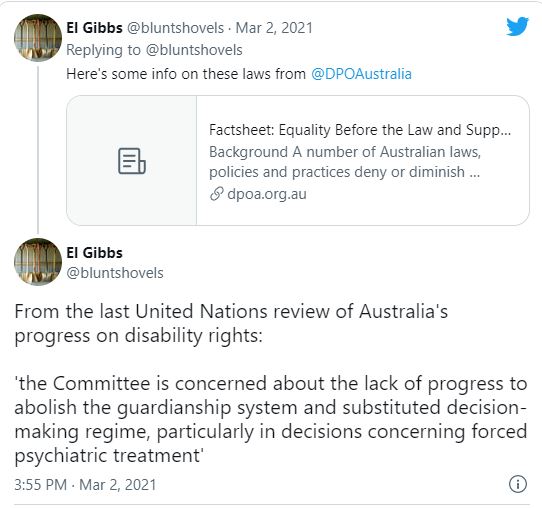#FreeBritney has many of us wondering: do we have conservatorships in Australia?

Photo by Chris Pizzello/AP
- Linda Steele Senior Lecturer, Faculty of Law, University of Technology Sydney
- Cameron Stewart Professor at Sydney Law School, University of Sydney
News Britney Spears’ father has agreed to step down from her conservatorship might have you wondering how equivalent laws work in Australia.
Australia doesn’t have “conservatorships” but rather guardianship and financial management laws for each state and territory.
Traditionally, there have been three legal options for appointing other people to manage your money and your affairs.
One is through the Supreme Court, which is a very formal process out of reach for many. A second option is through state-based mental health laws for temporary financial management while an individual is detained in a mental health facility.
A third option is via state-based guardianship tribunals. Exactly how it works varies from state to state, so check the links below for details:
- New South Wales
- Queensland
- Victoria
- South Australia
- Western Australia
- Tasmania
- Australian Capital Territory
- Northern Territory

Guardianship tribunals
In most cases, financial management and guardianship laws relate to people who have been deemed incapable of managing their affairs, or who are considered in need of a financial manager or guardian, because of a disability.
That might include a person with a mental health condition, an intellectual disability, dementia or a disability affecting their ability to communicate their decisions.
Since the 1980s, state-based tribunals (made up of people with different expertise) have been able to make decisions to appoint someone to be a financial manager and someone to be a personal guardian.
In general, financial managers (sometimes called “administrators”) take care of the money side of things while a personal guardian makes decisions around their health and lifestyle.
Guardians can also play a major role in decisions about “restrictive practices” that normally involved limitations being placed on a person’s ability to move around (sometimes via physical or chemical restraints). Guardians might also be given power to make decisions regarding special medical treatments — for example, whether to put a person on long-acting contraception.
To have a financial manager or guardian appointed, a person has to make an application to the court or a guardianship tribunal. The applicant might be a government employee, a family member, a service provider or a medical professional who forms the view the individual in question doesn’t have the capacity to make their own decisions.
Read more: Freeing Britney requires reconsidering how society thinks about decision-making capacity
Two trends in Australia
Australia has recently seen two trends in relation to financial managers and guardians.
Firstly, we are seeing more people living with dementia having financial managers appointed. This can be to prevent financial abuse or it can be a form of financial abuse in itself.
The second trend relates to the National Disability Insurance Scheme (NDIS). The creation of the NDIS has resulted in people who previously had their affairs managed informally by friends or family now needing to get financial managers and guardians appointed. For some, that has resulted in less control over their affairs.
When someone applies to a tribunal to have a financial manager appointed, the tribunal will consider factors such as
- how capable the person with disability is and what might in in their best interests
- what family support they have around them
- what might occur if a financial manager was not appointed.
Getting a decision reviewed
In most jurisdictions, guardianship and financial management orders are subject to routine reviews. Under the legislation, the welfare and interests of the person whose affairs are being managed are meant to be given paramount consideration. In practice, however, once a financial manager or personal guardian is appointed, it can be difficult to get them removed.
It can also be difficult to prove that circumstances have changed and that the financial manager or guardian is no longer needed. This is especially the case if the person is still contending with poverty and/or social isolation, or doesn’t have access to social networks or resources to support them to make decisions, or has not been provided with opportunities to develop their skills.
According to the Intellectual Disability Rights Service (IDRS):
Many of the people contacting IDRS about financial management orders find the restrictions very distressing, frustrating and detrimental to their lives. They are often limited in the social activities they can enjoy. Moreover, most are frustrated and angry with their financial managers (especially where the financial manager is a government agency).
Read more: Britney Spears’s conservatorship alludes to an older story of controlling women artists
Substituted decision-making versus supported decision-making
Financial management and guardianship laws involve what experts in this field call “substituted decision-making”, because someone else is making decisions on behalf of an individual with disability.
United Nations bodies and Australian Disabled People’s Organisations have long argued for the abolition of substituted decision-making laws and the introduction of supported decision-making systems based on a person with disability’s “will and preferences”. The latter aims to provide access to support and resources for people to make their own decisions about their finances and other aspects of their lives.

The United Nations Committee overseeing the Disability Convention in 2019 expressed concern Australia has made little progress to abolish substituted decision-making regimes, and replace it with supported decision-making systems. The same UN committee also urged the Australian government to eliminate restrictive practices.
Only Victoria has changed its laws to formally incorporate the UN Convention into its Guardianship and Administration Act 2019 and even this law still employs mechanisms for substituted decision-making in many cases.
The Royal Commission into Violence, Abuse Neglect and Exploitation of People with Disability is currently exploring guardianship and financial management laws, so the discussion regarding guardianship laws and the role of the will and preferences of people with disability is not going away.
Republished with permission from TheConversation under a commons license.





 Afrikaans
Afrikaans Albanian
Albanian Amharic
Amharic Arabic
Arabic Armenian
Armenian Azerbaijani
Azerbaijani Basque
Basque Belarusian
Belarusian Bengali
Bengali Bosnian
Bosnian Bulgarian
Bulgarian Catalan
Catalan Cebuano
Cebuano Chinese (Simplified)
Chinese (Simplified) Chinese (Traditional)
Chinese (Traditional) Corsican
Corsican Croatian
Croatian Czech
Czech Danish
Danish Dutch
Dutch Esperanto
Esperanto Estonian
Estonian Filipino
Filipino Finnish
Finnish French
French Frisian
Frisian Galician
Galician Georgian
Georgian German
German Greek
Greek Gujarati
Gujarati Haitian Creole
Haitian Creole Hausa
Hausa Hawaiian
Hawaiian Hebrew
Hebrew Hindi
Hindi Hmong
Hmong Hungarian
Hungarian Icelandic
Icelandic Indonesian
Indonesian Irish
Irish Italian
Italian Japanese
Japanese Javanese
Javanese Kannada
Kannada Kazakh
Kazakh Khmer
Khmer Korean
Korean Kyrgyz
Kyrgyz Lao
Lao Latin
Latin Latvian
Latvian Lithuanian
Lithuanian Luxembourgish
Luxembourgish Macedonian
Macedonian Malagasy
Malagasy Malay
Malay Malayalam
Malayalam Maltese
Maltese Maori
Maori Marathi
Marathi Mongolian
Mongolian Myanmar (Burmese)
Myanmar (Burmese) Nepali
Nepali Norwegian
Norwegian Pashto
Pashto Persian
Persian Polish
Polish Portuguese
Portuguese Punjabi
Punjabi Romanian
Romanian Russian
Russian Samoan
Samoan Scottish Gaelic
Scottish Gaelic Serbian
Serbian Sesotho
Sesotho Shona
Shona Sindhi
Sindhi Sinhala
Sinhala Slovak
Slovak Slovenian
Slovenian Somali
Somali Spanish
Spanish Sundanese
Sundanese Swahili
Swahili Swedish
Swedish Tajik
Tajik Tamil
Tamil Telugu
Telugu Thai
Thai Turkish
Turkish Ukrainian
Ukrainian Urdu
Urdu Uzbek
Uzbek Vietnamese
Vietnamese Welsh
Welsh Yiddish
Yiddish Yoruba
Yoruba Zulu
Zulu